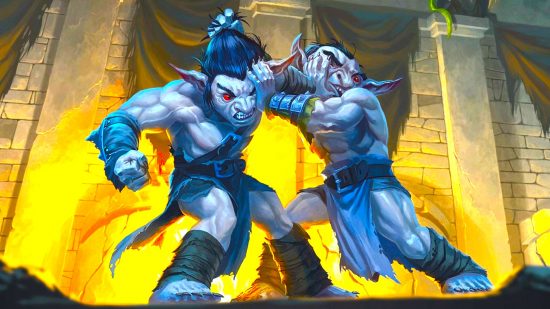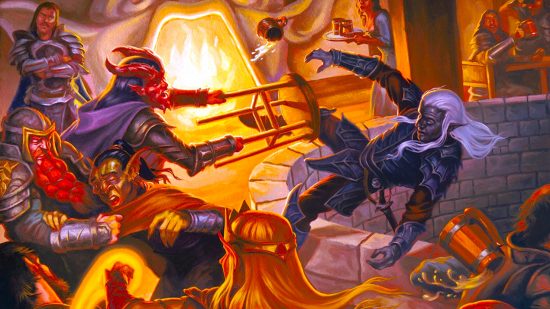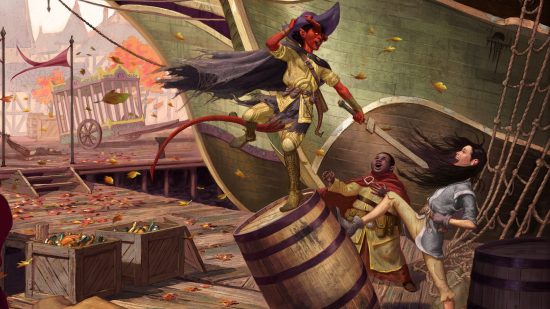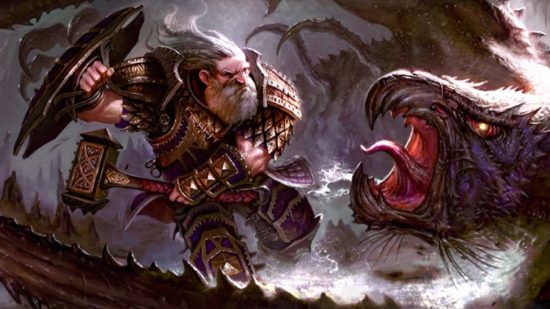Don’t underestimate the humble DnD shove. While it may replace an attack action, it can have a wide range of strategic benefits in combat. Free your Dungeons and Dragons character from a sticky situation, set your friends up to attack with advantage, or simply push your foe off a comically large cliff. If you want to make the best use of this action, you’ll need a shove 5e rules guide – and we’re here to provide.
Below you’ll find the D&D shove rules from the core DnD books explained. We’ll also recommend some DnD classes, DnD races, and 5e feats you should pick up to make your mighty shoves even mightier. Even if you already know how to play Dungeons and Dragons, we might have something new to teach you.
Here’s everything you need to know about the DnD shove:
How a DnD shove works
According to chapter nine of the Player’s Handbook, a shove is a special melee attack action that allows you to push an enemy. When you shove a creature, you make an Athletics check instead of your usual attack roll. Your target makes an Athletics or Acrobatics check to defend against the shove (as long as it isn’t incapacitated – it can’t contest your shove if it is).
If you roll higher than your enemy, you can choose one of the following effects:
- You knock the creature prone
- You push the target five feet away from you
Since shoves count as an attack action, you can shove more than once in a turn if you’re able to make multiple attacks. Go ham, DnD Fighters.
The Player’s Handbook also says that you can only shove creatures that are no more than one DnD size larger than you. Understandably, you also need to be able to reach your target.
Why use a DnD shove?
While it may be tempting to choose a regular attack over the shove action, there are plenty of situations where a simple push can change the tide of battle.
Prone enemies are at a literal disadvantage
Prone enemies are forced to crawl around the battlefield, and they’ll need to use at least half of their movement speed to stand up again. Better yet, a prone creature has disadvantage on attack rolls, and all attacks made against them from within five feet have advantage.
If you can knock an enemy prone before your team’s best melee fighters take their turn, you can set the target up to take a whole lot of damage.
Push enemies into harm’s way
Pushing someone five feet away isn’t all that impressive, but sometimes five feet is all you need. Shove an enemy into your ally’s Spike Growth, Spirit Guardians, Cloud of Daggers, etc, and you’ve scored some free damage. Push them off a very tall ledge, and you’ve got a lot of damage to dole out. If you’re gifted enough with your Athletics rolls, this might seem more viable than trying to score a regular attack on your turn.
A free Disengage
Failing all else, you can use a shove to avoid DnD opportunity attacks. Five feet of forced movement gives you enough room to move away from a nearby foe, and if you can attack more than once on your turn, you haven’t sacrificed all your attacks to Disengage 5e.
End a grapple
If you can put space between you and a creature that’s used a DnD grapple on you, the grapple ends. Sure, you could make the regular Athletics or Acrobatics check to escape the grapple, but shoves offer additional benefits. If you’re able to attack more than once on your turn, shoving allows you to make use of those extra attacks once you’re free, for example.
How to make a DnD shove better
On its own, a good shove can be useful. But in Dungeons and Dragons, there are plenty of ways to make your pushing powers even better:
Grapple them too
While prone enemies are at a major disadvantage, they can escape the situation by simply standing up. If you want to keep them on the ground, we suggest adding a grapple to the mix. A successful shove and grapple means your enemy is weak to melee hits and they can’t stand up.
Shield Master
As long as you’re carrying a DnD shield and you attack on your turn, the Shield Master feat lets you shove enemies as a bonus action. You have to finish that first attack before you can shove, but setting a target up for further advantage attacks is never a bad thing.
Barbarian Rage
When a DnD Barbarian uses their Rage feature, they have advantage on all DnD skill checks involving Strength. This includes the Athletics check you’ll need to make to shove.
Rogue Expertise
DnD Rogues gain the Expertise feature at level one, which allows them to add their proficiency bonus twice when rolling certain skill checks. Expertise in Athletics makes you excellent at shoving enemies.
Prodigy
If you don’t fancy building the world’s beefiest Rogue, you could take the Prodigy feat instead. This gives you expertise in a skill of your choice, so it achieves similar effects without the Sneak Attacks.
You’ll need to play a DnD Half-Elf, DnD Half-Orc, or a DnD Human to access this feat. Variant Humans get a free feat from the get-go, so they’re a great option for getting a shoving/grappling build going early.
Rune Knight Fighter
A Rune Knight 5e Fighter has the ability to increase their size, and they gain advantage on Strength checks when they do so. This makes you better at shoving, and you can get around the pesky size restrictions on the action.
Enlarge/Reduce
If a DnD Wizard or 5e Sorcerer casts Enlarge/Reduce, they can increase an ally’s size and give them advantage on Strength checks. That gives them some decent shoving power.
Enhance Ability
Another simple DnD spell that makes for better shoves is Enhance Ability. Simply choose Strength to give advantage on Shove rolls.
For more rules guides, here’s how a DnD level up works. We can also tell you everything you need to know about DnD stats and DnD languages.




